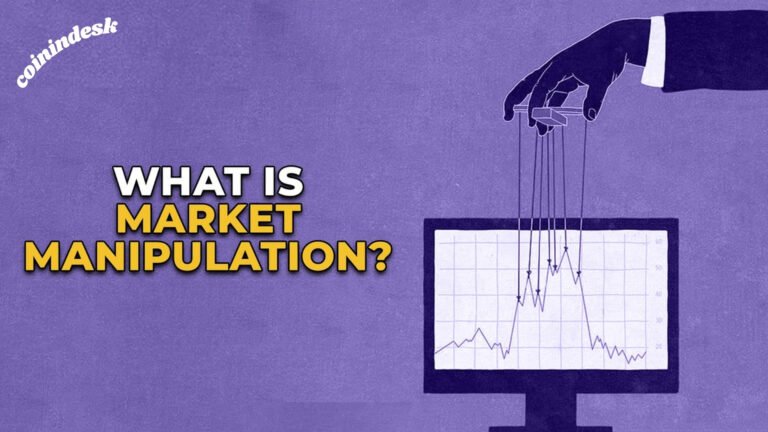Market Manipulation in Cryptocurrency. In the cryptocurrency industry, “market manipulation” means knowingly using misleading tactics to drive up or down the price of cryptocurrencies. Unusual or unexpected price changes that are unrelated to significant news or trends could be an indication of market manipulation. A sudden increase in social media activity or coordinated online discussions with substantial transaction volumes could be an attempt at manipulation.
Furthermore, investors and authorities may question the market’s integrity if they see ongoing irregularities or unclear trading practices, which could be signs of manipulation. Additionally, the crypto realm is rife with pump-and-dump operations, in which a group willfully spreads false information to attract buyers, driving up the price of a cryptocurrency. Then, the buyers sell their holdings for a profit.
Furthermore, significant holders, or “whales,” manipulate the market by buying or selling massive quantities of a cryptocurrency on purpose to influence its price. Spoofing, in which large purchase or sell orders are placed and subsequently canceled to create the illusion of market demand, also aims to influence the cryptocurrency market.
Insider trading, in which individuals make transactions using confidential information, also affects cryptocurrency markets. These misleading strategies capitalize on the market’s lack of oversight and openness. Regulators try to stop this so everyone can participate in free and fair marketplaces.
Is Manipulating Cryptocurrency Legal?

The activities that determine whether manipulating bitcoin markets is lawful differ by jurisdiction. Manipulating bitcoin markets using deceitful or unlawful means is illegal in numerous countries and can potentially breach financial or securities laws. Many manipulative methods, such as insider trading, pump-and-dump scams, spoofing, and others, are forbidden under the current financial regulations controlling conventional securities markets.
Crypto legislation is closely monitored and enforced by regulatory bodies worldwide, including the United States Securities and Exchange Commission (SEC), to prevent market manipulation and protect investors.
However, the landscape of cryptocurrency regulation is constantly evolving, and the rules about market manipulation may be murkier or different in different jurisdictions. Due to cryptocurrencies’ decentralized and global character, it can be challenging to implement laws against manipulation occasionally. Nevertheless, the cryptocurrency industry is actively working on steps to curb illegal market activity and establish more specific laws.
Vulnerabilities and Manipulation Risks in Decentralized Exchanges
While decentralized exchanges (DEXs) provide more independence and safety, they aren’t immune to security flaws. Worryingly, reentrancy attacks and code errors might cause funds to be lost due to intelligent contract weaknesses. Another problem that requires fixing is liquidity pool manipulation, which occurs when dishonest people use pools that lack liquidity by changing prices.
Another kind of front-running that can happen on DEXs is when traders try to get a leg up on one another by seeing each other’s orders and completing their transactions before them. Because blockchain transactions are visible, front-runners can target DEXs. Attackers use bots to keep an eye on pending transactions; when they find a good opportunity, they execute it fast to manipulate pricing to their advantage.
Fake token listings that contain harmful or fraudulent tokens jeopardize users’ funds and trust. The DEX platform’s reputation takes a hit, and customers lose money when they fall for these tokens, which seem like real enterprises. Strict token verification processes and user education are necessary to protect investors from these fraudulent listings and maintain decentralized exchanges’ integrity.
Additionally, DEXs face regulatory uncertainty, which may lead to legal and compliance issues. To reduce these dangers, token listing protocols, liquidity mechanisms, anti-front-running protections, and smart contract audits must be stringent. Ongoing security audits and user education are crucial for bolstering decentralized exchanges against manipulation and vulnerabilities and promoting a safer and more reliable decentralized trading ecosystem.
Wash Trading Affects Crypto Market Manipulation

It is typical practice in the bitcoin market to buy and sell assets frequently, known as “wash trading,” to create the illusion of liquidity. This dishonest method skews market metrics by falsely increasing traders’ perceptions of market activity and misleading them about actual supply and demand. This leads to skewed price discovery and the spread of false information among investors.
Because asset values can be manipulated by phony volume, jeopardizing the market’s stability and fairness, wash trading erodes investor trust and raises the risk of market manipulation. Regulatory groups increasingly use these deceptive practices to keep the Bitcoin industry transparent and trustworthy. Therefore, fixing wash trading is critical for boosting trust, allowing for true price discovery, and making the Bitcoin market a better place for everyone.
Also Read: Methods for Generating Interest from Cryptocurrencies
Preventing Cryptocurrency Market Manipulation
Legislative actions, technical developments, and user education are necessary to prevent Bitcoin market manipulation. Improved market surveillance technologies that allow real-time monitoring of trade activity are crucial to detecting suspicious trends, wash trades, and other forms of market manipulation. Global regulators must work together to create and enforce transparent regulations to prevent market manipulation.
Exchanges can reduce manipulation by implementing transparency measures, such as disclosing trading volumes and requiring correct reporting. Also, smaller exchanges are less affected by manipulators as liquidity on many platforms increases.
Designing decentralized order books and implementing commit-reveal systems are two state-of-the-art anti-manipulation features that can help decrease front-running and wash trading. To stop front-running, commit-reveal systems use cryptography to delay transaction information release safely. Similarly, decentralized order books reduce the possibility of manipulation by spreading and managing trading data over a network rather than relying on a central authority.
Educating consumers about the dangers of manipulative acts and advocating for ethical trading strategies is critical. Implementing robust risk management strategies, such as setting trading limits and utilizing algorithms driven by artificial intelligence to detect anomalous behavior, helps protect investors.
Finally, it’s essential to encourage the cryptocurrency community to practice ethical trading and compliance. Fostering self-regulation and ethical conduct among market participants can enhance the market’s resilience against manipulation, leading to a more stable and trustworthy cryptocurrency market. Stakeholder engagement, technical advancements, and regulatory vigilance are essential for keeping the Bitcoin market honest.


